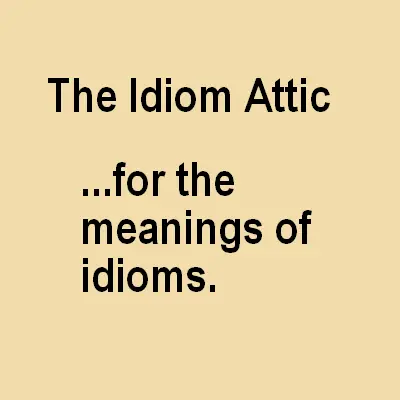Building
Country house hotel
Meaning
An upmarket hotel located in a revamped rural mansion.
Examples
We wanted to go somewhere special for our anniversary and Jim booked us into a lovely country house hotel in the Cotswolds.
Hear the idiom spoken
Elvis has left the building
Meaning
The primary performer has left. There’s no point waiting around.
Examples
Go away. We’re closed. It’s all over. Nothing to see here. Elvis has left the building. Do I need to go on?
Where did it originate?
USA, late 20th century.
Where is it used?
Worldwide, but more common in the USA than elsewhere.
Hear the idiom spoken
More idioms about
How the idiom originated
Flea market
Meaning
A market used to buy and sell inexpensive goods. The kind of place that might sell carpets infested with fleas.
Examples
I need some cheap costume jewelry for the school play. Maybe the flea market would be the place.
Where did it originate?
Britain, early 20th century.
Where is it used?
Hear the idiom spoken
More idioms about
Funny farm
Meaning
A mental hospital.
Examples
Sadly, Jack was so psychotic they had to take him to the funny farm.
Where is it used?
Hear the idiom spoken
More idioms about
How the idiom originated
Glass ceiling
Meaning
An unacknowledged or unseen discriminatory barrier that prevents women and minorities from rising to positions of power.
Examples
I’ve more experience, better qualifications and work harder than my male co-workers, yet I still don’t get promoted and no one tells me why. I guess that’s what they call the glass ceiling.
Where did it originate?
America, 20th century.
Where is it used?
Hear the idiom spoken
More idioms about
How the idiom originated
Man cave
Meaning
A shed or some other retreat that men decorate in the way they choose (with or without their male friends) and use to relax in traditional male pursuits.
Examples
After I retired Sheila was getting so fed up with me being around the house that she made me turn the outhouse into a man cave. Now the guys come round each afternoon to play cards and watch tv and I’ve made a sculpture out of beer cans.
Where did it originate?
USA, late 20th century.
Where is it used?
Worldwide. A fairly recent coinage but spreading rapidly around the world.
Hear the idiom spoken
More idioms about
No room to swing a cat
Meaning
An awkward or confined space.
Examples
This hotels room is supposed to be for two people! Hardly, there’s not room to swing a cat in here.
Where did it originate?
Britain, 17th century. Not, as is often believed, derived from the use of the cat o’ nine tails.
Where is it used?
Hear the idiom spoken
More idioms about
How the idiom originated
Shovel ready
Meaning
A building project in which all the preliminaries have been arranged.
Examples
Planning consent is done. The site is cleared. The project is shovel ready.
Where did it originate?
USA, late 20th century.
Where is it used?
Mostly USA and Britain.
Hear the idiom spoken
More idioms about
Browse more Idioms
About the Author

Idioms
A-Z
A B C D E F G H I J K L M N O P Q R S T UV W XYZ
Categories
AdageAgreementAmericaAnimalsAphorismAustralian originBiblicalBlueBodyBrass tacksBuildingBusinessChildhoodChildrenClicheClockClothesCockney rhyming slangColourComedyConflictCountryCrimeDanceDateDeathDisgustDrinkEducationEffortEmotionEuphemismExcellenceExcessFailureFamilyFirst worldFoodFrenchFruitGreek originHabitHairHappinessHonestyHousehold itemsHyperboleLanguageLatinLegalLocationLuckMadnessMedicalMilitaryMisfortuneMoneyMusicNameNatureNauticalNonsenseNumberPatiencePlaceProverbProverbialReduplicationRelaxationReligionRiskScienceSecretsSexShakespeareSlangSportStupiditySuccessSurpriseTechnologyThe human bodyTheatreTimeToolTravelTrickeryVehicleWaterWeatherWork
Suggest a new idiom